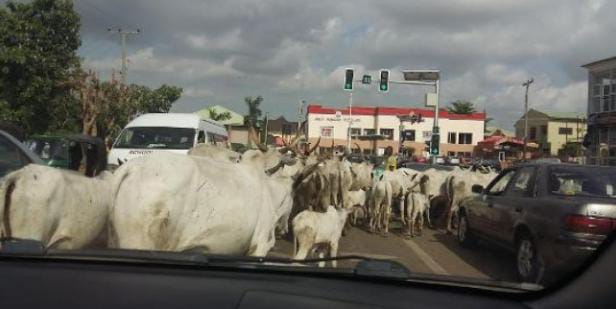Presidency, Miyetti Allah meet in Abuja over stray cows, nomadic education

(DDM) – The Nigerian Presidency has held a high-level meeting with leaders of the Miyetti Allah Cattle Breeders Association of Nigeria, focusing on cattle encroachment in Abuja and broader livestock reforms.
Diaspora Digital Media (DDM) gathered that the dialogue, convened by the Sultan of Sokoto, brought together key presidential aides, livestock experts, and pastoralist leaders to address long-standing disputes between herders and the state.
The talks followed recurring incidents of stray cattle obstructing traffic, damaging farms, and heightening tensions between pastoralist communities and urban residents in the Federal Capital Territory.
The Senior Special Assistant to President Bola Tinubu on Livestock Development, Idris Abiola-Ajimobi, emphasised the administration’s commitment to resolving the crisis.
He revealed that the government is working to establish grazing reserves, ranches, and modern veterinary facilities to reduce nomadic practices.
Abiola-Ajimobi insisted that structured settlements would improve cattle productivity while easing the frequent clashes between herders and host communities.
The Special Assistant to the Minister of Education, Dr. Balarabe Kakale, linked the livestock policy reforms to educational initiatives.
He explained that pastoralist children would benefit from expanded nomadic schools and integrated Almajiri programmes tailored to their learning needs.
Dr. Kakale lamented the high number of out-of-school children among herder families, stressing that education must align with pastoralist lifestyles.
The President of Miyetti Allah, Baba Othman-Ngelzarma, openly acknowledged the scale of the crisis.
He admitted that pastoralist children represent nearly 80 percent of Nigeria’s out-of-school population.
He pledged cooperation with the federal government’s initiatives to integrate pastoralist families into both education and modern ranching systems.
Ngelzarma called on the government to ensure that policies are practical, well-funded, and implemented without bias.
The Sultan of Sokoto urged both parties to treat the talks as a crucial turning point in addressing pastoralist challenges.
A technical committee is to be set up to design practical measures to curb the roaming of cattle across Abuja streets.
The committee will also review the integration of grazing corridors, veterinary support, and community engagement.
Analysts say the meeting reflects a growing urgency in balancing the economic importance of livestock with urban development and food security.
Nigeria has witnessed repeated clashes between farmers and herders, often escalating into deadly violence in states such as Benue, Plateau, and Kaduna.
Pastoralists argue that urban expansion has blocked traditional grazing routes, while farmers accuse herders of destroying crops and threatening livelihoods.
Observers believe that Abuja’s decision to merge livestock policy with education may provide long-term solutions to poverty and insecurity in the herding community.
The meeting marks one of the most comprehensive efforts by the Tinubu administration to address a crisis that has defied successive governments.
For residents of the capital, the focus remains on ending the menace of stray cattle that disrupt urban life and risk public safety.
Post Views: 8




